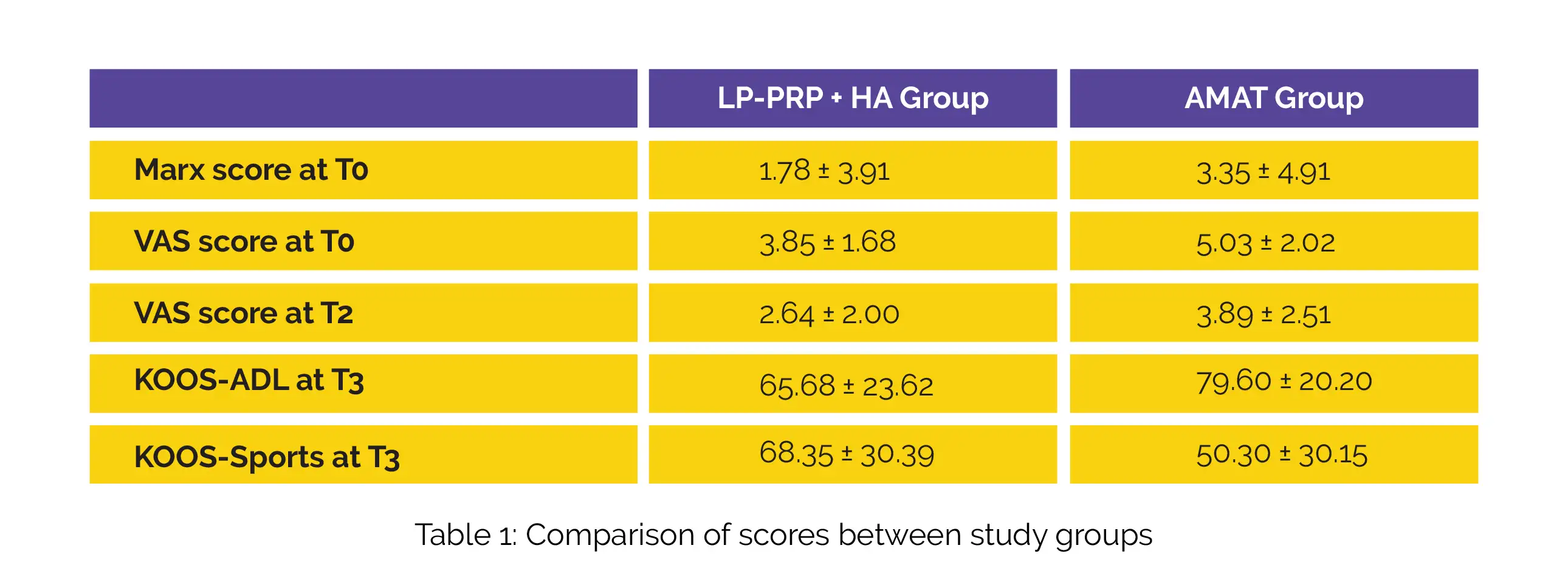Categories
Change Password!
Reset Password!


For symptomatic early knee osteoarthritis, autologous microfragmented adipose tissue and leukocyte-poor platelet-rich plasma in combination with Hyaluronic acid exhibit similar clinical efficacy.
A study depicted that in patients with osteoarthritis of the knee, three injections of Hyaluronic acid (HA) with leucocyte-poor platelet-rich plasma (LP-PRP) and a single dosage of autologous microfragmented adipose tissue (AMAT) therapies resulted in substantial clinical improvements in a number of parameters such as quality of life, pain, and knee function, with just minor differences between both treatments. At a two-year follow-up, this prospective randomized clinical study compared the clinical effects of LP-PRP and HA to a single dosage AMAT in Kellgren-Lawrence grade 0 to 2 osteoarthritis.
A total of 80 symptomatic knees were randomly assigned to two equal groups of 50 individuals (mean age: 62.38 ± 11.88 years). Group 1 had 40 knees that were administered autologous LP-PRP + HA, whereas Group 2 included 40 knees that got a single dose of AMAT injection. The International Knee Documentation Committee, Visual Analogue Scale (VAS) for pain, Marx, Tegner, and Knee Injury and Osteoarthritis Outcome Score (KOOS) were utilized to evaluate outcomes at 6 (T1), 12 (T2), and 24 (T3) months.
At each follow-up timepoint, side effects were noted. A subgroup analysis was done to analyze score differences among respondents of the same gender and age. At 6, 12, and 24 months, both the study groups demonstrated considerable functional and clinical betterment. When the two groups were compared, the AMAT groups had substantially greater pre-operative Marx and VAS scores, greater VAS at T2, higher KOOS-ADL at T3, and reduced KOOS-Sports at T3, as illustrated in Table 1:

No notable side effects were witnessed in either group of patients. Twelve (30%) individuals in the LP-PRP group had mild pain, redness, and swelling one day after injection, and 2 subjects experienced synovitis for two days, necessitating Paracetamol and local ice. Five (12.5%) AMAT group patients had bruising and ecchymosis at the fat aspiration site for 3 days.
In terms of functional improvement at various follow-up stages, AMAT did not exhibit significantly greater clinical improvement compared to three LP-PRP coupled with HA injections. Both treatments were safe, with no serious complications. At the mid-term follow-up, both treatments improved quality of life, pain, and knee function independent of gender or age.
European Journal of Orthopaedic Surgery & Traumatology
Autologous microfragmented adipose tissue and leukocyte-poor platelet-rich plasma combined with Hyaluronic acid show comparable clinical outcomes for symptomatic early knee osteoarthritis over a two-year follow-up period: a prospective randomized clinical trial
Alberto Gobbi et al.
Comments (0)